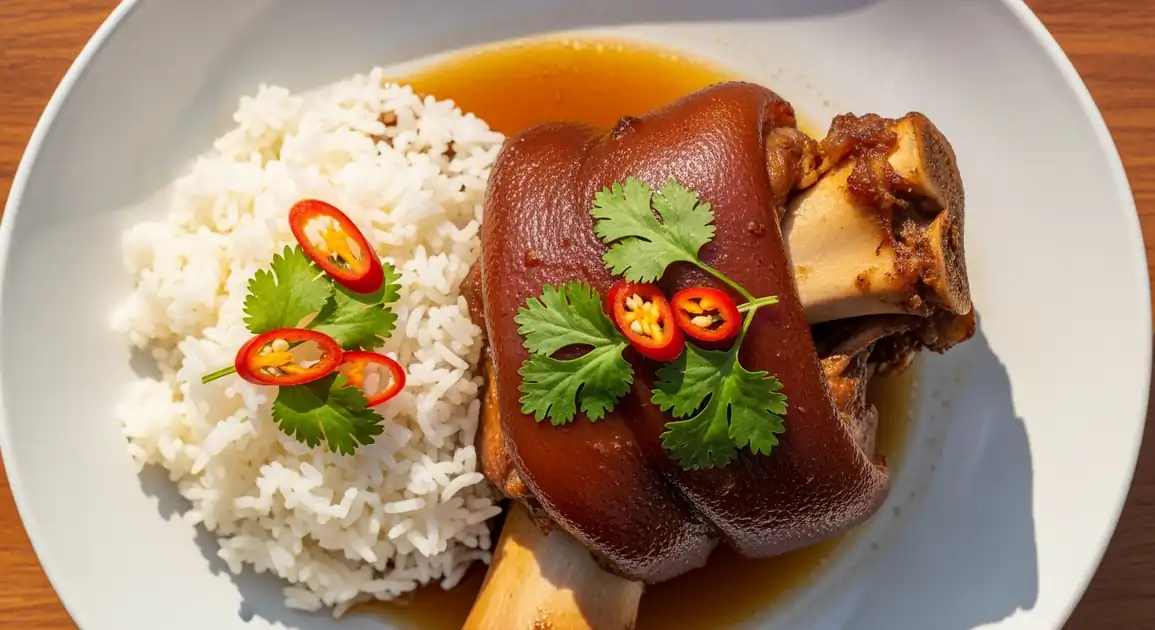Braised Pork Leg
ขาหมูพะโล้ (Kha Moo Palo)

Description
Bangkok offers perhaps the widest range of Kha Moo Palo options in Thailand, from century-old Chinatown specialists to modern mall food courts. The capital's version tends to balance sweet and savory elements perfectly, with the dish available virtually 24/7 across different neighborhoods. Bangkok's reputation for culinary excellence means even humble street vendors maintain high standards.
Dietary Information
Serving information
Serving style
Typically served on individual plates with rice, sometimes with a small bowl of clear soup on the side. Street vendors wrap in banana leaf packages or plastic for takeaway. Higher-end establishments might present it more elegantly with careful plating and premium Chinese-style ceramics.
Quick facts
Most dedicated vendors operate 10 AM - 9 PM. Some famous locations like Charoen Saeng Silom operate only until they sell out (often by 2 PM). Night markets and 24-hour vendors can be found in areas like Sukhumvit and Yaowarat.
Safety Tips
What to Look For
-
Braising liquid maintained at a constant simmer
The braising liquid should be kept hot (not just warm), which ensures food safety and indicates the vendor is continuously cooking throughout the day.
-
Clean cutting boards and utensils
Since the meat is handled after cooking, look for vendors who maintain separate stations for raw and cooked meat, and regularly clean their equipment.
-
Vendor uses fresh ingredients for accompaniments
Quality vendors provide freshly prepared side vegetables and newly cooked rice, not items that have been sitting out for extended periods.
-
Pork is cut to order
Better vendors slice the pork leg right before serving rather than pre-slicing large quantities that sit at ambient temperature.
What to avoid
-
Pre-cut pork sitting at room temperature
Avoid vendors who slice large amounts of pork leg in advance and let it sit out, which can allow bacterial growth and temperature abuse.
-
Cloudy, greasy braising liquid
Quality braising liquid should be clear (though dark). Excessive cloudiness may indicate poor maintenance or very old, potentially unsafe liquid.
-
Unrefrigerated garnishes and sauces
Condiments like chopped garlic in vinegar should be kept cool to prevent spoilage.
-
Stalls with very low turnover
This is a popular dish; empty stalls might indicate less fresh ingredients or lower quality that locals avoid.
Price information
Price range
Budget tips
- Chinatown (Yaowarat) vendors offer excellent value at 50-80 THB despite their fame.
- Victory Monument area has several good budget options at 45-70 THB.
- Avoid tourist-heavy areas like Khao San Road where prices can reach 120-150 THB for mediocre quality.
- Food courts in malls like Terminal 21 or MBK offer decent versions for 70-100 THB in air-conditioned comfort.
Value indicators
- Generous portion of both lean meat and skin.
- Deeply colored, complex braising liquid.
- Inclusion of at least one braised egg.
- Freshly blanched vegetables on the side.
- Complimentary small bowl of broth.
Where to Find This Dish
Yaowarat (Chinatown)
Bangkok's Chinatown hosts some of the most legendary Kha Moo Palo stalls, often family businesses passed down through generations with closely guarded recipes.
Yaowarat Road, Charoen Krung Road, Wat Traimit, Sampeng Market
Lunch, Evening (after 6 PM)
Victory Monument
The area around this major transit hub features several well-known Kha Moo Palo specialists, particularly in the adjoining soi (side streets).
Victory Monument BTS, Rang Nam Alley, Soi Phaya Nak
Lunch, Dinner
Sukhumvit
This long road and its many soi feature vendors catering to both locals and expatriates, with slightly adjusted flavors.
Sukhumvit Soi 38, Thong Lo, On Nut fresh market
Lunch, Dinner
Pratunam
The market area features several long-standing pork leg specialists, often serving shoppers and workers from the garment district.
Pratunam Market, Platinum Mall, Ratchaprarop Road
11 AM - 2 PM, 5 PM - 8 PM
Vendor Tips
- In Bangkok, vendors who display 'Michelin Guide Recommended' or 'Bib Gourmand' stickers generally maintain very high standards.
- Look for vendors with a sign stating 'น้ำซุปต้มสดใหม่ทุกวัน' (fresh broth made daily).
- Bangkok vendors often specialize - some focus exclusively on pork leg rather than offering many dishes, which typically indicates better quality.
How to Order
Regional Variations
-
Hongkong Style
(สไตล์ฮ่องกง (Sai Hongkong))
Some Bangkok vendors specifically advertise Hong Kong-influenced versions with a stronger five-spice profile and less sweetness.
-
Muslim-Friendly Duck Version
(ขาเป็ดพะโล้ (Kha Ped Palo))
For non-pork eaters, several Bangkok vendors offer duck leg braised in a similar style, especially around areas with Muslim populations.
-
Royal Thai Influence
(สูตรชาววัง (Soot Chao Wang))
Some upscale Bangkok establishments claim heritage from royal court recipes, featuring more refined seasoning and premium pork cuts.
-
Modern Fusion
(พะโล้สมัยใหม่ (Palo Samai Mai))
Contemporary Bangkok restaurants sometimes offer creative variations like braised pork leg with wine reduction or Japanese-inspired seasonings.
Cultural context
History
Braised Pork Leg reflects Thailand's historical Chinese immigration, particularly from the southern regions of China. The dish evolved from Chinese red-braised pork techniques but adapted to Thai palates with local ingredients and flavor preferences. While maintaining its Chinese roots with five-spice and soy sauce elements, Thai versions often incorporate palm sugar for sweetness and pair the dish with Thai condiments like spicy vinegar dipping sauce. It became popular throughout Thailand as comfort food that crosses cultural boundaries.
Local significance
In Bangkok, Kha Moo Palo exemplifies the city's diverse culinary heritage, particularly the influential Thai-Chinese fusion that defines much of the capital's food scene.
Eating customs
- In Bangkok, the dish is often enjoyed with extra condiments including sliced fresh chilies in fish sauce (prik nam pla).
- Locals typically know whether they prefer the 'nam daeng' (lighter, redder broth) or 'nam dam' (darker, more reduced) style.
- Bangkok diners often judge a place first by the quality of its braising liquid rather than the pork itself.